CTP Episode of the Day - 11.07.06 - Jump the Shark
Today's Cherished Episode: Jump the Shark (9x15)
Original Air Date: April 21, 2002
Written By: Vince Gilligan, Frank Spotnitz, and John Shiban
Directed By: Cliff Bole
When Morris Fletcher approaches the agents with information related to supersoldiers, they turn to the Lone Gunmen. The Gunmen, however, are knee-deep in a bio-terrorist's plot to release a deadly toxin.
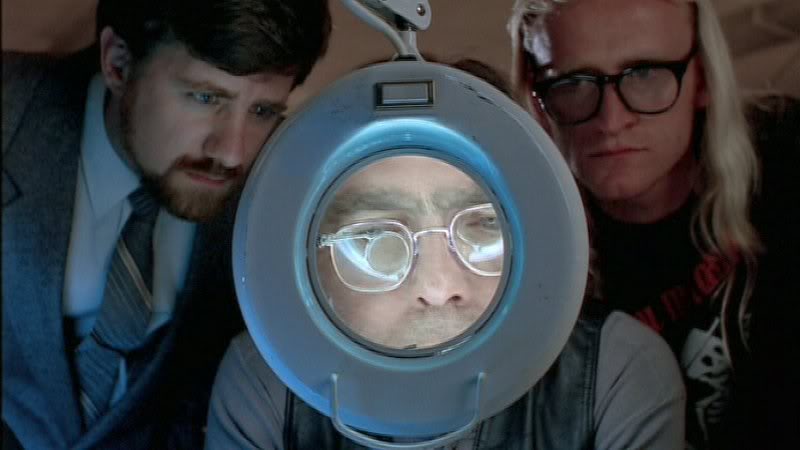
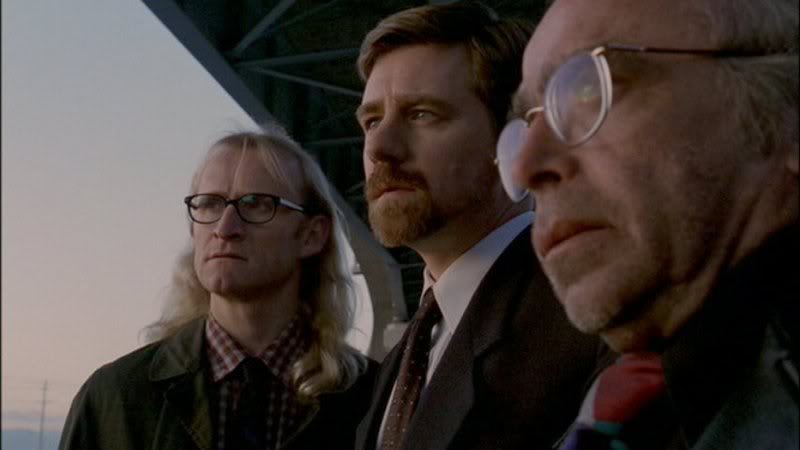
FROHIKE: "You gotta admit, Byers. It hasn't exactly been our year. And to top it all off, we screwed the pooch pretty good today. Maybe we should pack it in."
BYERS: "And do what instead? We never gave up. We never will. In the end, if that's the best they can say about us, it'll do."
Some "Jump the Shark" Tidbits & Musings:
-- The phrase "Jump the Shark" is a pop culture reference that has come to mean the defining moment when you know your favorite television program has reached its peak, and you know that from then on, it's all downhill. The phrase comes from an episode of Happy Days where Fonzie (in his leather jacket, no less) literally jumped over a shark on water skis; this moment was considered by many to be the instant when things started to go downhill for the TV series Happy Days. (Although the series did go on for another 100+ episodes after its infamous "jump the shark" moment.)
-- Jump-the-shark moments are typically scenes that finally convince viewers that the show has fundamentally and permanently strayed from its original premise. In these cases, they are viewed as a desperate and futile attempt to keep a series fresh in the face of a decline in ratings. In other cases, the departure or replacement of a main cast member or character or a significant change in setting changes a critical dynamic of the show.
-- "When we filmed the final episode of The Lone Gunmen series, we didn't know for sure if it would be the season finale or the series finale," said executive producer Vince Gilligan. "We hadn't gotten any indication from the network, and that's why we wrote it as a cliffhanger. But apparently we were the only ones who didn't know the handwriting was on the wall." Gilligan related that a writer friend who worked on the Fox animated series King of the Hill told him much later that although the King of the Hill writers loved The X-Files and The Lone Gunmen, they knew the show wouldn't make it. "Because of the animation, they film the King of the Hill episodes way in advance," Gilligan said. "And my friend told me that in one episode, they had one of the characters wearing a 'Bring Back the Lone Gunmen' tee-shirt -- an episode they filmed before we had even aired one episode of The Lone Gunmen. That show had its own problems with Fox, and my friend said they knew our show was not the kind of show that the network would get behind. So they knew it was doomed before it even got started."
-- When Fox canceled The Lone Gunmen in 2001, Gilligan and his co-executive producers John Shiban and Frank Spotnitz were sure that they still had a story to round out. "It was such a big cliffhanger sitting out there," Gilligan explained. "And we knew we wanted to resolve it."
-- The ninth season of The X-Files was the obvious place to tie up those loose ends. "Within the X-Files context, we sort of vowed to ourselves to make this work," stated Shiban. However, they had to wait an entire year from the last episode of The Lone Gunmen to write the resolution. Gilligan admitted to having some trouble when he actually sat down at the computer. "I spent a lot of time building it up in my head," he said. "The whole time saying 'This has to be the greatest episode ever. This has to serve two masters -- the X-Files and The Lone Gunmen series -- and marry them together perfectly. It has to be beautiful.'"
-- While crediting Spotnitz with making sure that the episode got done at all, Gilligan still toiled with developing the plot. "It took me the longest of about any episode to work my way through," he said. "It was a tricky one."
-- "The three of us felt very strongly about doing an episode of The X-Files that would bring closure for the fans of The Lone Gunmen series and to all the characters that were part of that series," said Spotnitz. "The fans of the Gunmen series were very loyal to us and we were determined to do this 'closure' episode no matter what. Unfortunately, we were the only people interested in doing it. To put it mildly, the studio was less than enthusiastic about it and didn't want to put out the money to hire the actors. We had zero support until we made the decision that the episode would include the Gunmen's deaths. That made our argument much stronger with the studio and they finally agreed to finance the episode. In that respect, it was a miracle that the episode got made."
-- "We enjoyed working on The Lone Gunmen so much," remembered Gilligan, "that we really wanted a chance to work with all those people one more time. Nobody wanted us to do this episode," he added, "and I think all three of us were proud that we got it made."
-- The writers agreed that they could not simply make the episode a continuation of The Lone Gunmen's finale episode, "All About Yves." "I was thinking along those lines," Gilligan acknowledged, "but Frank rightly said we couldn't exactly do that because this was a whole different television series -- one that we were using as a platform to finish the story." The writers also had to bear in mind that many X-Files fans may not have tuned in to the Lone Gunmen's series. "It would have thrown the X-Files audience too much," said Spotnitz.
-- "It was a little like bringing friends from school and friends from work together," said Shiban. "Half the party is familiar with some stuff, and the other half is familiar with other stuff."
-- The three put their heads together to figure out just where exactly the audience would find the Gunmen and their cohorts after a whole year. The story they came up with reunited the Gunmen, Jimmy Bond, and Yves Adele Harlow with arch nemesis Morris Fletcher (played comically and astutely by Michael McKean) who was pivotal to The Lone Gunmen finale. In "All About Yves," Fletcher orchestrated a dramatic con job, kidnapped Yves and left the Gunmen in a secure, underground bunker. Naturally, the Gunmen were none too thrilled to encounter Fletcher again.
-- Zuleikha Robinson and Stephen Snedden, as Yves Adele Harlow and Jimmy Bond, respectively, reprised the roles they played on the short-lived Lone Gunmen series in this episode. "We had a terrible time casting the role of Jimmy for the Lone Gunmen series," said Spotnitz. "Nobody could get it right. But once we saw Stephen, we knew there was no one else for the role."
-- In "Jump the Shark," Fletcher first drew Agents Doggett and Reyes into Yves' case by teasing them with the claim that she was a Super Soldier. The agents then brought in the Gunmen. However, the episode moved quickly out of the realm of Super Soldiers and into that of international terrorism, biological agents, and shark cartilage. Sharks were incorporated into the story after the title of the episode was chosen.
-- Spotnitz called the title, "a joke at our own expense" and a nod to the term which gained popularity thanks to an entertainment web site launched in 1997 and created by Jon Hein. The web site invited posters to vote on the precise moments when their favorite TV show "jumped the shark" and created "jump the shark" categories such as Character Death, Wedding, and Actor Replaced.
-- "During the ninth season there was a lot of discussion on the internet about the show 'jumping the shark,'" said Gilligan. "Whether the show had or hadn't -- that was up to each individual person to decide. But we decided to have some fun with it and take the onus off that. I kind of like it when a show ribs itself, and the idea of jumping the shark was sort of fun."
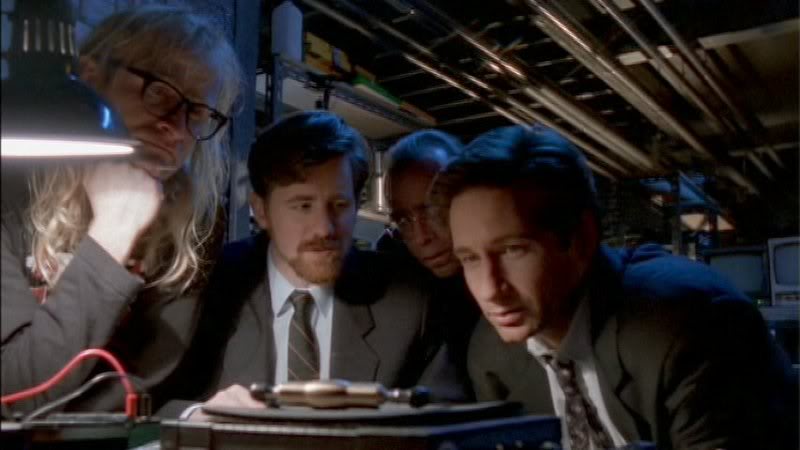
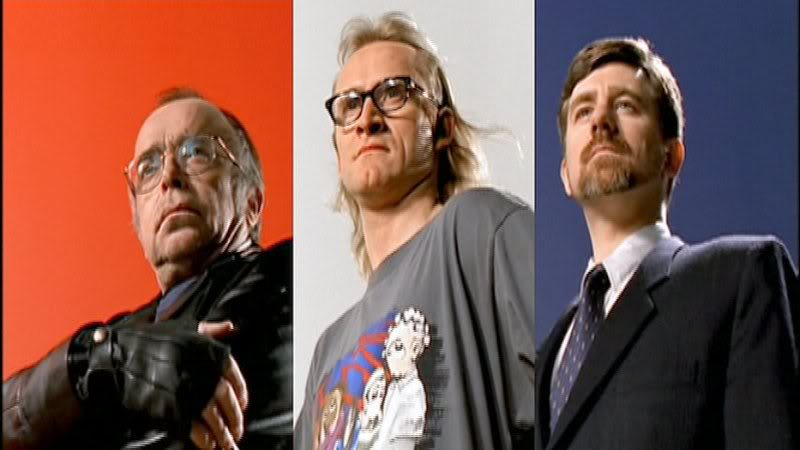
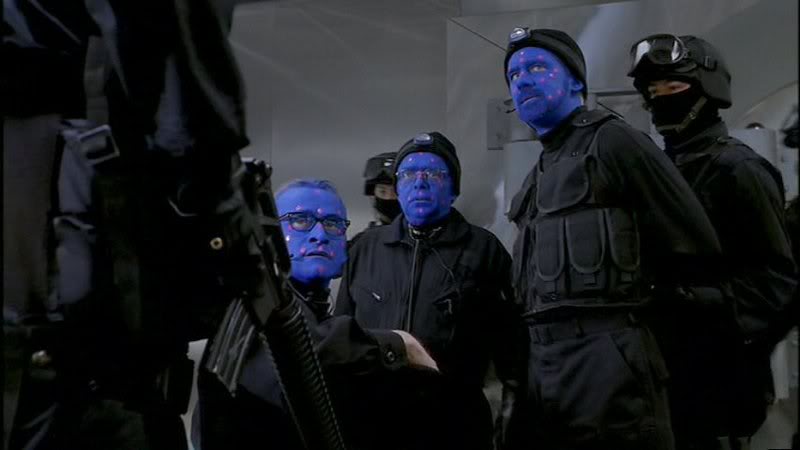
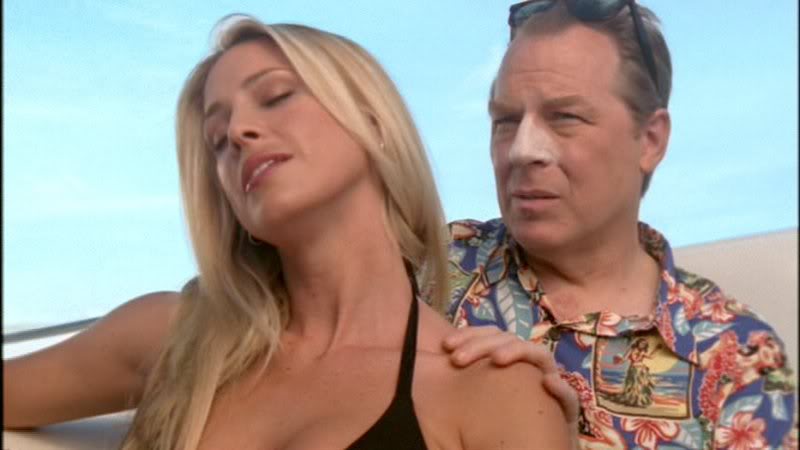
-- The producers arranged for Jon Hein to have a walk-on role in the episode, but unfortunately, his schedule did not allow for the appearance. Hein, however, was delighted to hear of his creation's use as the episode's title. "I thought it was great," he declared enthusiastically. "The X-Files always 'got the web' and actively incorporated it into the show with a great sense of humor and cleverness." At the time "Jump the Shark" aired, The X-Files was the site's second most popular vote-getter, and is still the fourth most popular vote-getter four years after the show ended.
-- After the writers secured their title, they looked for ways to incorporate sharks into the episode. Gilligan recalled that the writers liked the image of a shark in the first shot of the first act, so they came up with a scene that featured Fletcher on a boat in the Bahamas. "We threw that out for a long time because it felt, at first, that it got us off to the wrong start," said Shiban. But after several sessions of working out more traditional X-Files scenes, they came back to the original, more comedic one.
-- "We wanted to start it off and truly tease the audience in the classic sense, to get them intrigued," Gilligan said. "Michael McKean did just that." McKean was a favorite of the show's producers. "When an actor exceeds your expectations, it's great," said Spotnitz. "He was a surefooted actor, period. But he was also a great comedic actor, with great comedic timing and instincts."
-- "Michael was just a delight," said Shiban about the guest star. "He so embodies that character that it's scary. One of the reasons he was such a good fit with both The X-Files and The Lone Gunmen was because, as comic as he is, he carries himself with such a sense of reality." "He so got it," Gilligan added simply.
-- The actors who played The Lone Gunmen were also excited about reuniting with McKean. "We talked about Spinal Tap," joked Dean Haglund (Langly), "and I switched from fellow actor to annoying groupie."
-- "Michael was great," agreed Tom Braidwood (Frohike). "He's a character and a very funny man. He was a lot of fun to work with."
-- Gilligan likened the character of Morris Fletcher to Louie DePalma from the television series Taxi. "He was the guy you loved to hate," said Gilligan. "But you didn't really hate him. Deep down you sort of loved him."
-- The scene of Morris and Brittany on the boat in the Caribbean was actually shot in a water tank at Universal Studios. "Everything was shot against a green screen and the background was put in later, digitally enhanced to make it look more like the Caribbean," explained Spotnitz. The camera angles in the scene were deliberately low, "because if we had tilted up," said John Shiban, "you would have seen the Universal bus tours rolling by."
-- "The scene of Morris on the boat was intended to be very James Bond-ish with a touch of Jimmy Buffet," said Vince Gilligan. "In fact, the script said something about Morris Fletcher dressing much like Jimmy Buffett." "Living the Bond and Buffet existence, much like we are since the show ended," joked John Shiban.
-- The blueprints of the Jupiter Two spaceship from the TV series Lost in Space used in the show (that Morris Fletcher tried to pass off as the blueprints for a real flying saucer) were the actual blueprints for the Jupiter Two. They were obtained with the help of documentary filmmaker (and one-time executive producer of A&E's Biography) Kevin Burns, who had an office on the Fox lot and who was a friend of Frank Spotnitz. "I happened to mention to him that we were going to use the blueprints in an upcoming episode," said Spotnitz, "and he asked me if we had gotten permission to do that. As it turned out, Fox was very strict about it, and Kevin helped us get the permission we needed." Burns had a great love for and interest in 1960s TV series (he has the largest collection of The Munsters memorabilia in the world), especially series produced by the master of disaster Irwin Allen -- The Time Tunnel, The Land of the Giants, Voyage to the Bottom of the Sea -- and Lost in Space.
-- After Fletcher's humorous entrance, the story gradually became more serious, culminating in the Gunmen's touching final scenes with Yves and Jimmy. Balancing humor was something The X-Files writers had done numerous times throughout the series' nine seasons, especially when the Lone Gunmen were on hand. In this episode, however, it was especially challenging. "In the writing, we did a number of revisions around that very issue," stated Shiban. "The world in which these characters lived wasn't funny," Spotnitz elaborated. "We had to make it more real."
-- Over the course of writing The Lone Gunmen series, the producers, according to Gilligan, found the show "worked best when there was actually a little more drama rather than a little less." He thought they achieved this tone best in the series finale. "That episode struck a nice balance between comedy and sort of high stakes seriousness," he recalled wistfully. "We tried to strike that same tone in 'Jump the Shark.'" "This episode hit both ends of the spectrum," added Shiban. "It was a balancing act. We watched dailies every day and walked that tightrope."
-- Another challenge was the actual melding of the two shows. Once they got into the writing of it, it became very difficult to merge the two series together. Spotnitz referred to the combination of the two shows, something they had done before with the Millennium crossover in the seventh season, as a "massive headache."
-- Shiban remarked that it was difficult to communicate the complicated back-story that would have become The Lone Gunmen mythology had that series continued. "We kept running up to these moments where the three of us would be working on the script," he recounted, "when we asked 'Does The X-Files audience need to know this? Is the back story too complicated?' You have a whole world for a series, but this was just one episode."
-- The writers were faced with the daunting task of communicating this world to a viewing audience that may not have been familiar with The Lone Gunmen series. Calling it a "necessary evil," Gilligan explained that they tried to keep exposition to a minimum.
-- Another challenge to writing this episode was, as Spotnitz put it, "striking a balance in screen time between the Lone Gunmen and Doggett and Reyes." Add Morris Fletcher, Jimmy Bond, Yves Adele Harlow, and Kimmy the Geek to the mix, and you had a full plate for any writer. "It was an exercise in trunk packing," said Gilligan. "You had to use every little bit of available space. It was also a challenge for the director, often having eight or nine people in one scene together."
-- "Jump the Shark" was directed by Cliff Bole who also directed "Chimera" and two X-Files classic episodes: "Bad Blood" and "Small Potatoes."
-- Bole directed 25 episodes of Star Trek: The Next Generation, seven episodes of Star Trek: Deep Space Nine, and ten episodes of Star Trek: Voyager. So it should come as no surprise that The Bolians, an alien species in the Star Trek universe, are named after him.
-- While discussing the difficulty of working Agents Doggett and Reyes into the initial story, Shiban said that he found it just as problematic as having to incorporate the characters into the X-file into any script. "The X-Files was a hard form to master," he mused, "which was partly what I think made it so good when it clicked. But we struggled every week."
-- "We realized very early that our Act IV would mostly be the Gunmen, because we were doing a story about how the Gunmen were unsung heroes," Shiban said. "We wanted them to be heroic in the climax. Therefore, we knew that [Doggett and Reyes'] role would be diminished at some point, and that made it easier in some ways."
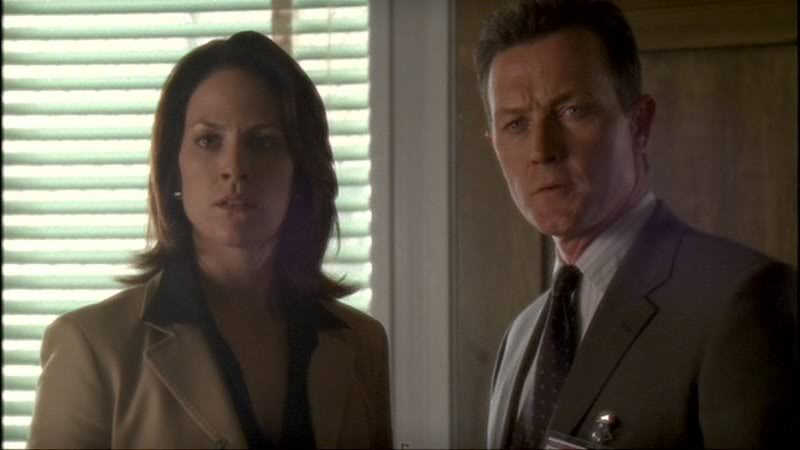
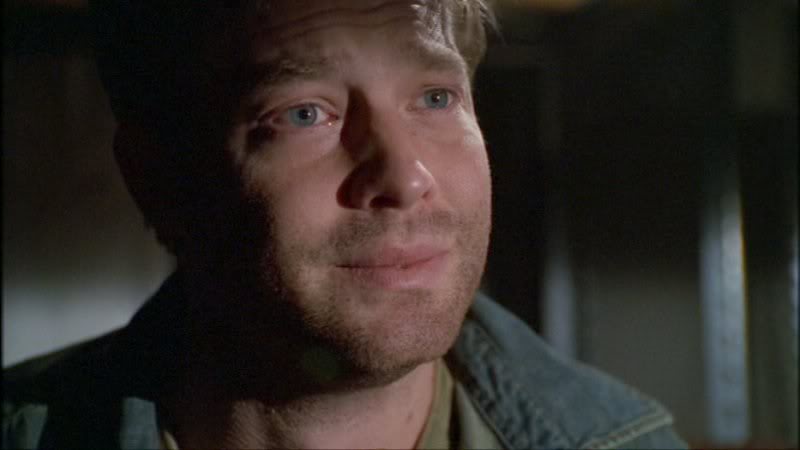
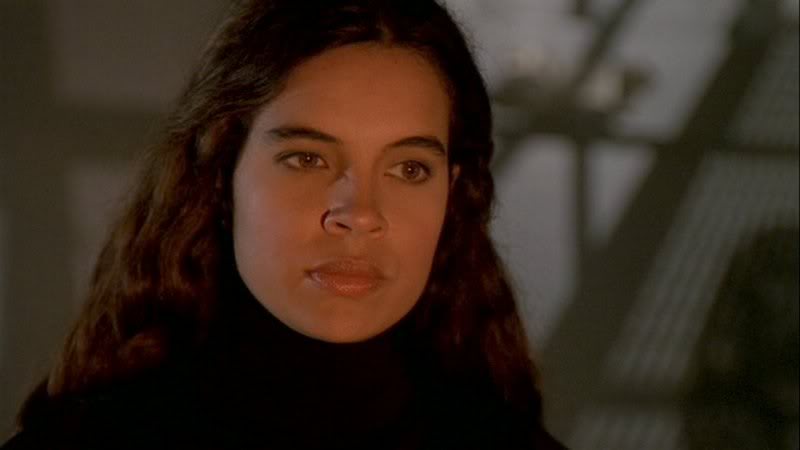
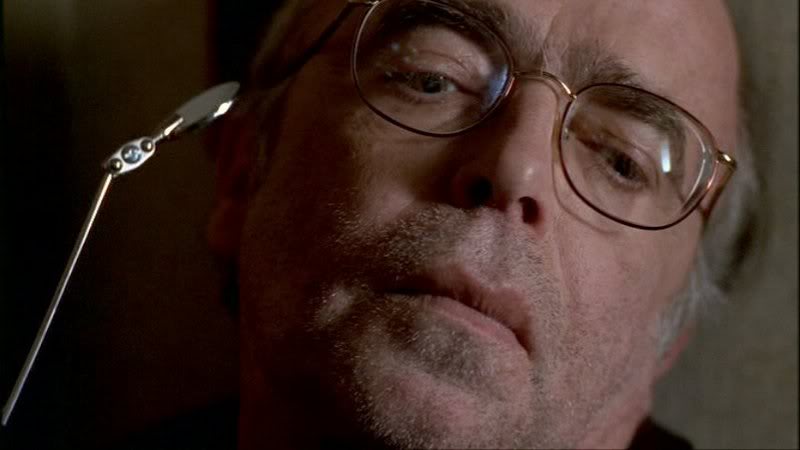
-- The Season 9 DVD's contain one deleted scene from "Jump the Shark" featuring Doggett and Reyes investigating the crime scene where Professor Houghton was killed.
-- In their "Jump the Shark" DVD commentary, when Professor Houghton's name appears on his office door, the writers mentioned the habit of naming characters for people they knew. "Was Houghton named after anybody?" Shiban asked. "Houghton Mifflin," Spotnitz said with a laugh. (Houghton Mifflin is a leading educational publisher in the United States, publishing textbooks and other educational materials. "See Spot Run," joked Gilligan. "The only book I ever read."
-- At the time Spotnitz, Gilligan, and Shiban recorded their audio commentary for "Jump the Shark" for the X-Files Season 9 DVDs, a decision had not been made as to whether the Lone Gunmen series would be released on DVD. (Of course, it subsequently was.) Knowing the "Jump the Shark" episode was not particularly popular with X-Files fans, the three implored "the three people who might be listening to this commentary" to "do whatever you can, write to whomever you can write to, to ask that the series be released on DVD." During the commentary, Gilligan noted that even if the Lone Gunmen DVD were ever released, it would probably not contain the Pilot episode, which originally aired on March 4, 2001, and which featured a jumbo jet nearly crashing into the World Trade Center, eerily foreshadowing the events of September 11, 2001. "Maybe it shouldn't ever be shown again," reflected Gilligan. (However, the "Pilot" episode is included on the Lone Gunmen DVD set.)
-- Given those circumstances, it's interesting and ironic that the writers chose to use a biological terrorist plot in the middle of New Jersey as the plot device for this episode. At one point in the DVD commentary, Vince Gilligan remarked that he hoped no terrorist would ever try something like the scenario depicted in the episode (which led to the remarks about the "Pilot" episode).
-- Spotnitz, Gilligan, and Shiban did the "Jump the Shark" Season 9 DVD commentary together, noting it was the first time they had done the commentary as a trio. ("I really like doing it this way," Gilligan said during the commentary. "For those people who've heard me do my commentaries solo, you know I suck.") During their conversation, they discussed the fact that the characters of the Lone Gunmen might never have been fleshed out except for the fact that "necessity was the mother of invention." The episode "Unusual Suspects" (which Chris Carter named, according to Vince Gilligan), was written because David Duchovny and Gillian Anderson were unavailable for an X-Files episode at the beginning of a season because they were still shooting the X-Files movie. Though in their commentary, Spotnitz, Gilligan, and Shiban weren't sure what season that was -- "It's pretty bad that the show has only been over for a year [when they recorded the commentary]," Shiban joked, "and we can't remember which season was which."
-- "Fans of the X-Files love to point out our continuity blunders," said Frank Spotnitz. "But it's interesting to me that fans rarely point out a big one. The area outside of the Lone Gunmen's door is never the same." This was partly because "the Lone Gunmen were created by Glen Morgan and Jim Wong as comic relief," explained Spotnitz, "and they were only inserted into episodes to bring some levity or to help move the plot along. Because they were used so sparingly, a standing set of their office was never built for The X-Files. Spotnitz noted that the Gunmen's office layout used in "Jump the Shark" was similar to the one used in the Gunmen series rather than in The X-Files series.
-- Jim Fyfe, who played Jimmy the Geek in the The X-Files episode "Three of a Kind" and his twin Kimmy the Geek in The Lone Gunmen and this episode, recalled his fondness for the three actors who played the Lone Gunmen, as well as their on-screen counterparts. "I love them," he said. "As guys they're great, and as characters they were great."
-- In the scene in the Lone Gunmen office when Kimmy is trying to use the Gunmen's outdated computer system and tells Doggett and Reyes that the boys are broke, Robert Patrick and Annabeth Gish were not on set the day most of the scene was filmed. Their portion of the scene was added in later.
-- The biggest X-File in this episode is why Reyes was wearing leather pants. Is that approved apparel in the FBI's Dress Code Manual?
-- Vince Gilligan "Holly" references (references to his girlfriend) were usually reserved for episodes written solely by Gilligan, but "Jump the Shark" contains one -- Hartwell College in Kearny, New Jersey. Hartwell is Holly's middle name.
-- There's also a much less obvious Holly reference: The small mirror that Frohike used to see around corners belonged to Vince Gilligan. "It was a neat little gadget that was a gift from my girlfriend," Gilligan recalled. "I really like stuff like that, and I don't think I ever got it back either."
-- In "Jump the Shark," Yves Adele Harlow's real name is revealed to be Lois Runtz. That name had no significance according to the three writers, but they did note that in the Lone Gunmen series finale, Yves real name was revealed to be something completely different, but the scene was ultimately cut, so they did not use the same name in this episode.
-- The scene where Frohike lit up his first cigarette (after quitting 20 years previously) was an homage to Humphrey Bogart. "We always thought Frohike had a little Bogart quality to him," said Frank Spotnitz, "and we included that brief scene to give him a little bit of Bogie."
-- "Jump the Shark" contained the final "John Gillnitz" reference. John Gillnitz is, of course, a combination of the names of the three staff writers -- John Shiban, Vince Gilligan, and Frank Spotnitz. There were six references in all: "Wetwired," "Leonard Betts," "Christmas Carol," "Dreamland II," "Theef," and "Jump the Shark." "Although the original John Gillnitz reference was written by Mat Beck," Shiban said, "we tried to use it whenever the three of us wrote a script together. It was our own little code, a sort of 'we made this' reference in the middle of an episode. Sometimes we say that the three of us are the Lone Gunmen."
-- Marcus Giamatti, who played John Gillnitz, went on to play Peter Gray on Judging Amy.
-- John Prosky, who played the Medical Examiner, is the son of well-known actor Robert Prosky, who among numerous other roles played Sgt. Stan Jablonski on Hill Street Blues (replacing Michael Conrad after his death).
-- The role of the Speaker at the Bioethics Forum is played by Thomas Schnauz, who wrote episodes "Lord of the Flies" and "Scary Monsters." Schnauz also wrote two episodes of The Lone Gunmen and dialogue for the X-Files video game, "Resist or Serve." According to Frank Spotnitz, Schnauz wrote the speech that he is delivering at the Forum, "and it was filled with sexual innuendo -- all about a missile being guided into a vulnerable target."
-- Once & Future Retreads: In addition to Michael McKean and Jim Fyfe, Timothy Landfield (Professor Douglas Houghton) was Cobra in "En Ami."
-- Choosing to have the Lone Gunmen die at the end of "Jump the Shark" did not come easily to the co-writers of the episode. "It was actually a really hard decision to make," explained Spotnitz. He exposed his fondness for the Gunmen, saying, "It's funny, because they were fictitious characters, and the show was coming to an end, but we really had a lot of affection for them."
-- The three writers knew that many X-Files fans were outraged by the decision to kill off the Lone Gunmen, "But it definitely wasn't a decision that we took lightly," said Spotnitz. "We loved the show and we were so proud of it. We loved Bruce, Dean, and Tom and were so proud of them for all they accomplished. They went from playing minor characters to carrying a series. We loved those guys and we loved those characters. So the big question from fans became, 'if you loved them so much, then why did you kill them off?'"
-- "We had many, many discussions of whether we should have them die," said Spotnitz, noting again that that decision was an integral part of the episode getting made at all. "And after that decision was made, we had many, many more discussions about how they should die. We felt those guys would want to go together, and that they deserved a noble and heroic ending."
-- "Even after we made the decision, I really never wanted it to happen," said Gilligan. "But we knew The X-Files was ending, we knew the Lone Gunmen series would never be brought back, we knew we'd never see them on the screen again. So why not send them out in a blaze of glory?" (Although as Shiban pointed out on the DVD commentary, the Gunmen actually did appear on screen again, for a brief cameo on the X-Files series finale, "The Truth.")
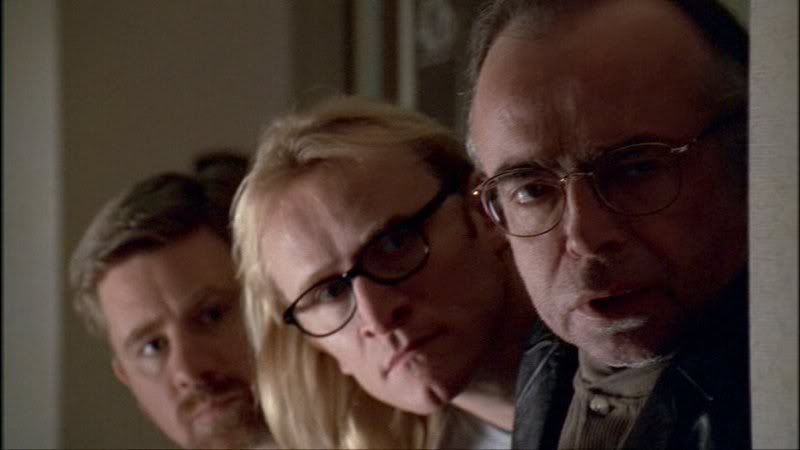
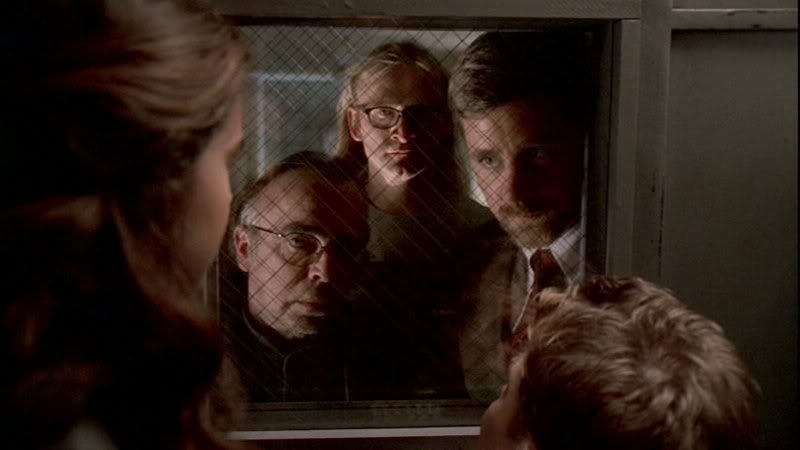
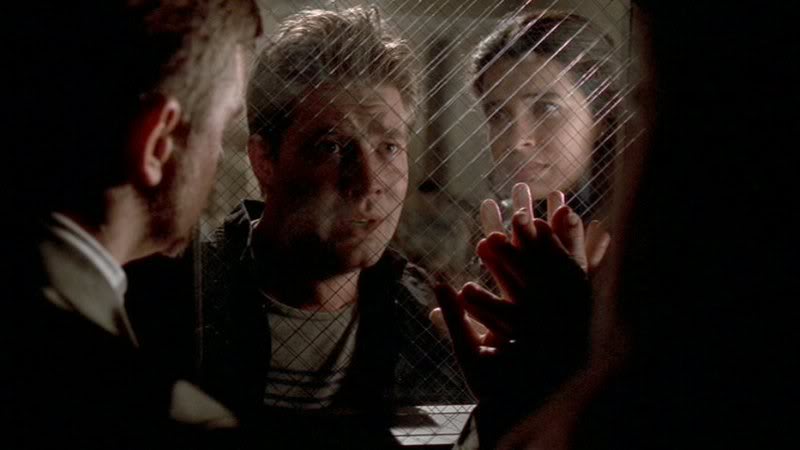
-- "The fact that we were the ones who made the decision to kill them off was particularly ironic," said Spotnitz, "because if it hadn't been for us, Frohike would most likely have been killed off in Season 4. Glen Morgan wrote a script ['Musings of a Cigarette-Smoking Man'] in which Frohike was killed at the end. When the three of us read the script, we couldn't believe it. We thought Frohike and the Gunmen were much too important to the series at that time to kill one of them off. So the three of us went to Chris, as did Tom Braidwood, and lobbied very hard that Frohike not be killed. Eventually, Chris agreed and the script was changed, which Glen was not too happy about."
-- "I'm really not sure why Glen wanted to kill Frohike at that point," added Gilligan. "But William Faulker once famously observed that in order to write a good novel, 'you must kill your little darlings,' [the characters you have created], so I guess that tendency is in all writers."
-- Spotnitz said that he, Gilligan and Shiban wanted to give the Gunmen a special ending, one that could only be achieved with such a dramatic climax. "It felt like it was the right thing to do," he said. "We could really make them into big heroes and give them their moment to shine." Although they did not, at first, know how they wanted the Gunmen to meet their fate, the writers had definite ideas about how it should play out. "We just knew that we wanted it to be unequivocally heroic."
-- Chris Carter's announcement that the ninth season of The X-Files would be the last came just as the writers were plotting out this one storyline. That was when they knew what they had to do. "It gave us the impetus to do this kind of ending," Shiban said. Although a bit traumatic to comprehend at first, Shiban found himself excited at the story prospect. "If it was done well, there was no more heroic thing to do to a character," he said. "It seemed just like the perfect end for the unsung heroes of the world."
-- The producers did consider the effect on loyal Gunmen enthusiasts. "We knew the ending was going to be challenging for fans of the Lone Gunmen," said Gilligan. "It made part of me sad, but it was hopefully a noble end." Shiban had his own rationalization. "They died to save the world, and that to me was a fitting end."
-- Reactions about the decision for the Gunmen's demise was mixed among the three actors who had played the roles since the first season of The X-Files. They all agreed that the deaths of Frohike, Byers, and Langly, while sad, were fitting. "I'd already mourned the fact that the show was ending," said Bruce Harwood (Byers). "The fact that we were being killed, I don't think made too much of a difference to me. It didn't surprise me that we went out that way."
-- "Isn't that how we all want to go?" remarked Dean Haglund. "Well, maybe not so painfully," he laughed.
-- Tom Braidwood was not enthusiastic about the ending at first. "I guess I was a little disappointed," he admitted. "I didn't quite see why it had to happen." But Braidwood, who worked on the Vancouver set of the series as an assistant director for Seasons One through Five, was able to see the producers' need to wrap up The X-Files characters once and for all. "In the end, it was right for them," he surmised.
-- The producers were happy with the final script as a tribute to the Gunmen, but they understood that fan reaction was undoubtedly mixed. "Some hate us for it," said Shiban. "But hopefully the ones who said they hated the idea still cried when they saw it."
-- "At the end of the day, if the fans of The Lone Gunmen series were pleased, that was enough for me," said Gilligan. Although he hoped that all X-Philes would enjoy it, Gilligan offered up some morsel of completion for the fans of the canceled series. "They stuck with us through thick and thin, and I wanted to see something resolved for them."
-- The last night of shooting on this episode held an air of sadness for Braidwood, Haglund, and Harwood, as at the time, they thought it would be their last night of shooting on any episode of The X-Files. (Of course, they did return, as ghosts, in the series finale.) But the mood was light, the actors and crew chatted and laughed as they waited to film scenes, just like during any other episode of the show. Several crewmembers asked for pictures with The Lone Gunmen cast. But the tone was more somber when the cast and crew shot the close-ups for the trio's final scene, which happened to be their death scene.
-- The Gunmen's final scene is a bit of an homage to Spock's "the needs of the many outweigh the needs of the few" death scene in Star Trek II: The Wrath of Khan. However, it was not the idea of the three writers/producers. "The actors came up with that on set," said Spotnitz. "And we found out later about its significance." However, that scene did manage to fuel conspiracy theories among fans that, like Spock, the Gunmen weren't really dead after all. (After all, the Lone Gunmen taught us to look for conspiracies everywhere!)
-- On that final shooting day, the end of the Lone Gunmen also brought up feelings among the actors about the end of The X-Files as a series. "I'm really sad to see it go," said Jim Fyfe. "I think all successful shows become a part of the culture in a way. I'll miss it." "What I'll miss are the people, because they're all great to work with," Tom Braidwood reflected. "It's been a wonderful experience, and that's what I'll miss the most."
-- In addition to other reasons, much of the criticism heaped on "Jump the Shark" stemmed from not having Scully involved in the episode's action. Except for a brief shot of her and one line at the boys' funeral, she was absent from the episode (as was Skinner, who fans felt should have been integral in the Gunmen's final episode as well). This was not the fault of the writers (at least in Scully's case), but rather a scheduling problem with Gillian Anderson. "Gillian was not available for this episode," Gilligan said. "In fact, we didn't even think we would have her for the funeral scene, but we did everything we could so that she could be available. It would have been such a shame if neither Mulder nor Scully was there, since the Gunmen were always there for them. And of course Mulder couldn't be as he was still missing at that point in the series." (Although many fans felt that the episode should have included a shot of Mulder attending the funeral in the distance -- much as he said he attended Deep Throat's funeral.)
-- The funeral scene was shot at the Los Angeles National Cemetery, located off Wiltshire Boulevard in West Los Angeles. "We were very lucky to find a location so close that looked so much like Arlington National Cemetery," Spotnitz said.
-- As noted above, The X-Files is still the fourth highest vote getter (at this writing) on the "Jump The Shark" website. While most voters (more than 400) feel the show *never* "jumped the shark," more than 220 people said that making the movie was the point when the series *did* jump the shark. Moving from Vancouver to L.A. is the next highest vote getter, and then, somewhat surprisingly to me, the third highest vote getter is the death of the Lone Gunmen. I guess it just shows how well loved those geeky guys really were.
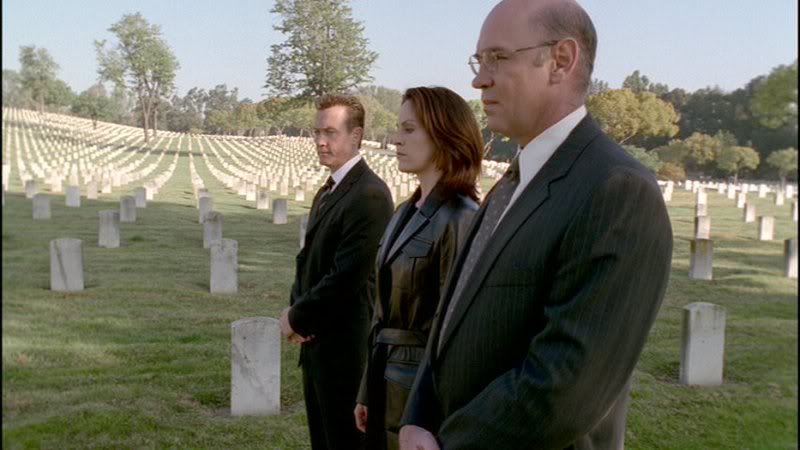
-- On a personal note, although I perhaps better understand the writer's reasons for killing off the Lone Gunmen, I still don't agree with them. The writers wanted to bring closure to the fans of The Lone Gunmen series, but I can't understand why fans who loved that series would necessarily want to see their favorite characters die. I do understand that the writers wanted that "Lone Gunmen-centric" episode "for the fans" (and deservedly so), and it appeared that the only way they could get that Gunmen-centric episode made was to have the Gunmen die. The question then becomes does the end justify the means -- was it important to have the Gunmen-centric episode at all costs? I don't think so.
-- There must have been another way to send those guys out "in a blaze of glory" that might have involved a little less screen time but that didn't necessitate a visit from the Grim Reaper. Certainly having them assist Mulder and Scully in making their escape in "The Truth" would have been just as heroic to fans and would have kept the characters true to the roles they served throughout the series. Yes, perhaps they made the ultimate sacrifice to save the world (or at least a lot of people in it), but I never felt that being those kind of heroes was their goal in either series. I always felt they were trying to "save the world" in other ways and that was enough for me. And I'd rather have three live supportive friends than three dead heroes, and I think Mulder and Scully would have felt the same.
-- The X-Files always used the deaths of supporting characters to great effect and to tell great stories -- Scully's father, Mulder's father, Deep Throat, Mr. X, Agent Pendrell, just to name a few. If the Gunmen had perished helping Mulder and Scully find that last bit of truth they were searching for, at least they would have died fighting the good fight. That would have truly sent them out in a blaze of glory that I could respect. But IMBO, the deaths of the Lone Gunmen at that stage of the game were pointless, dramatically and logically. Lucky for us they live on in fanfic and DVD.
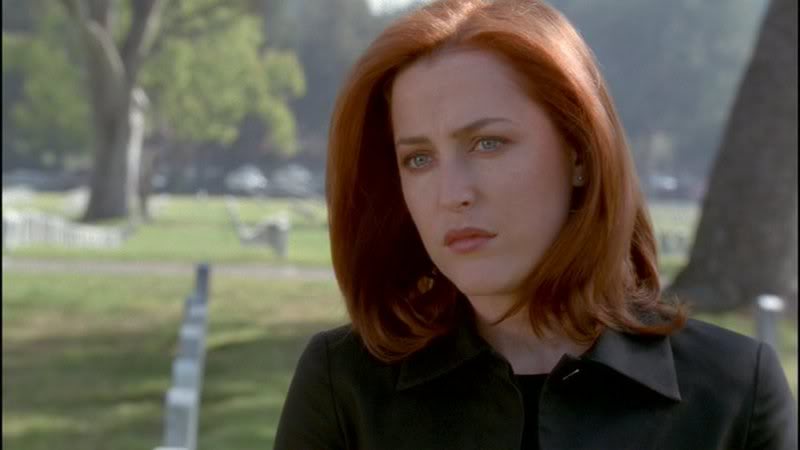
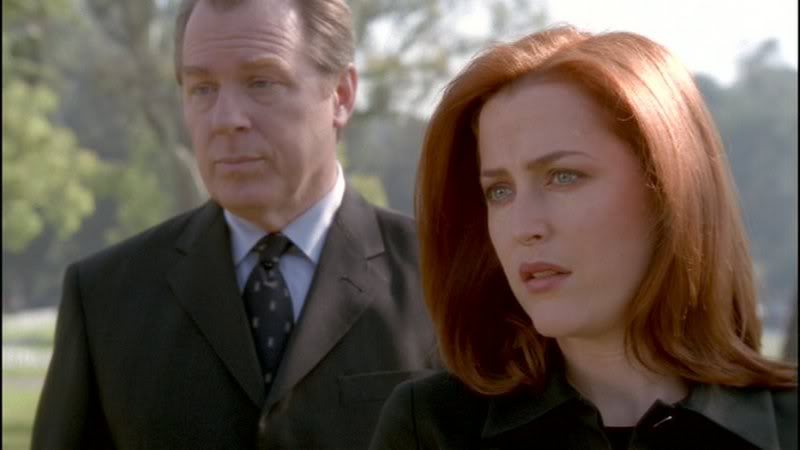
(Thanks to chrisnu for today's pics.)
Please share your first impressions, favorite (or cringe-worthy) moments, classic lines, favorite fanfic, nagging questions, repeated viewing observations, etc., as today we celebrate "Jump the Shark."
Polly